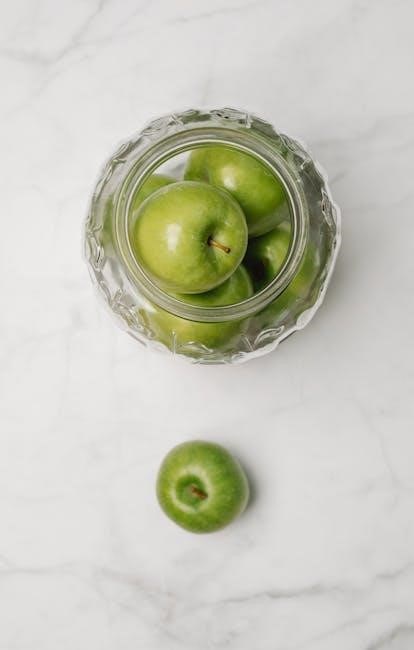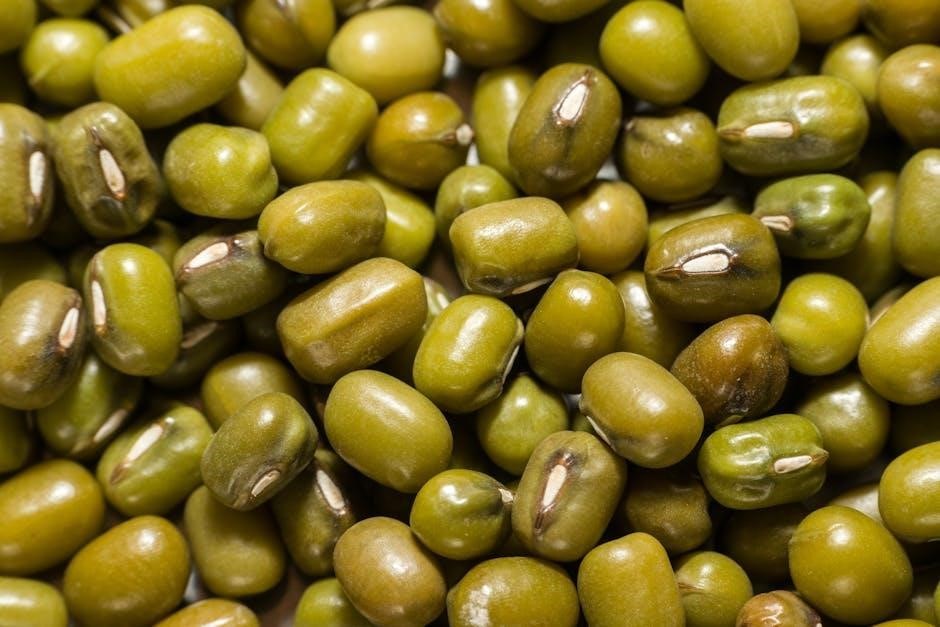
plant based meal plan pdf
A plant-based meal plan PDF provides structured guides for transitioning to a healthier, sustainable diet. These plans include recipes, grocery lists, and daily meal ideas, promoting wellness and environmental benefits while offering customizable options for various lifestyles and preferences;
1.1 What is a Plant-Based Meal Plan?
A plant-based meal plan is a structured guide designed to help individuals transition to a diet centered around plant-derived foods. It typically includes detailed recipes, grocery lists, and daily meal ideas, ensuring a balanced and nutritious intake. These plans often cater to various dietary needs, such as gluten-free or high-protein options, and may offer flexibility for different lifestyles. The primary goal is to provide a sustainable and healthy eating framework, making it easier to adopt and maintain plant-based eating habits. By focusing on whole, unprocessed foods like fruits, vegetables, grains, and legumes, a plant-based meal plan promotes both personal well-being and environmental sustainability.
1.2 Importance of Meal Planning for a Plant-Based Diet
Meal planning is essential for a successful plant-based diet, as it helps streamline the transition to a diet rich in fruits, vegetables, grains, and legumes. A well-structured plan ensures nutritional balance, preventing deficiencies and maintaining energy levels. It also saves time and reduces stress by providing clear guidance for daily meals. Additionally, meal planning promotes sustainability by minimizing food waste and optimizing grocery shopping. For those new to plant-based eating, a meal plan offers a roadmap, helping to avoid common pitfalls like monotony or lack of variety. By organizing meals in advance, individuals can stay committed to their dietary goals while enjoying delicious and nutritious plant-based dishes.
1.3 How to Choose the Right Plant-Based Meal Plan PDF
Selecting the right plant-based meal plan PDF involves considering your dietary needs, lifestyle, and preferences. Look for plans that emphasize whole, unprocessed foods and provide balanced nutrition. Ensure the plan includes a variety of recipes to keep meals interesting and tailored to your cooking skills. Check if it offers flexibility, such as options for different calorie needs or dietary restrictions. A good plan should include a grocery list and meal prep tips to save time. Opt for PDFs with clear, organized layouts and customizable features. Reading reviews or testimonials can also help you choose a reliable and effective plant-based meal plan that aligns with your goals and preferences.

Benefits of a Plant-Based Meal Plan
A plant-based meal plan promotes improved health, environmental sustainability, and budget-friendly eating. It supports weight management, boosts energy, and enhances mental clarity, aligning with a sustainable lifestyle.
2;1 Health Benefits of a Plant-Based Diet
A plant-based diet offers numerous health benefits, including improved energy levels, enhanced digestion, and better mental clarity. By focusing on whole, unprocessed foods like fruits, vegetables, and grains, individuals can reduce the risk of chronic diseases such as heart disease and diabetes. Plant-based meals are rich in fiber, vitamins, and minerals, promoting a healthy gut and immune system. They also tend to be lower in saturated fats and cholesterol, contributing to better cardiovascular health. Many people report feeling more vibrant and experiencing fewer digestive issues after adopting a plant-based lifestyle. These benefits make a plant-based meal plan an excellent choice for overall well-being and long-term health.
2.2 Environmental Impact of Plant-Based Eating
Plant-based eating significantly reduces environmental impact by lowering greenhouse gas emissions, water usage, and land degradation. Animal agriculture is a major contributor to carbon emissions, deforestation, and water pollution. By choosing plant-based options, individuals can help mitigate these issues. Plant-based diets require fewer resources, preserving ecosystems and biodiversity. This sustainable approach supports eco-friendly food production, aligning with global efforts to combat climate change and promote environmental health. Embracing plant-based meal plans fosters a healthier planet, ensuring resources are used efficiently and responsibly for future generations.
2.3 Cost-Effectiveness of Plant-Based Meal Planning
Plant-based meal planning is often more budget-friendly than diets heavy in meat and processed foods. Staples like beans, grains, and vegetables are generally affordable and versatile. Meal prepping and bulk buying further reduce costs. Shopping for seasonal produce and planning meals around what’s available can also save money. Many plant-based recipes use inexpensive ingredients, making them cost-effective for families or individuals. Additionally, reducing meat consumption lowers grocery bills, as plant-based protein sources like lentils and chickpeas are typically cheaper; Overall, plant-based meal planning can help create delicious, nutritious meals without breaking the bank, making it a sustainable choice for long-term budgeting.
2.4 Weight Management and Plant-Based Diets
Plant-based diets are highly effective for weight management due to their focus on whole, nutrient-dense foods. These diets tend to be low in saturated fats and high in fiber, which promotes satiety and reduces overeating. Studies show that individuals following plant-based meal plans often experience significant weight loss and improved body composition. The emphasis on fruits, vegetables, and whole grains helps maintain a healthy calorie balance. Additionally, plant-based meals are typically lower in calories but higher in volume, making it easier to stick to portion sizes. This approach not only supports weight loss but also encourages long-term weight maintenance and overall health improvement.

Structure of a Plant-Based Meal Plan
A well-structured plant-based meal plan includes daily and weekly schedules, featuring balanced recipes, grocery lists, and nutritional guidance to ensure sustainability and ease of implementation.
3.1 Daily Meal Plan Structure
A daily plant-based meal plan typically includes breakfast, lunch, snacks, and dinner, each designed to provide balanced nutrition. Breakfast options often feature overnight oats or smoothies, while lunches might include salads or whole grains. Snacks are usually fruits, nuts, or veggie sticks, keeping energy levels steady. Dinners focus on hearty dishes like stir-fries or lentil curries. Each meal is crafted to incorporate a variety of whole, unprocessed foods, ensuring adequate protein, fiber, and vitamins. Portion control and meal prepping tips are often included to simplify the process. These structured plans aim to make plant-based eating accessible, nutritious, and enjoyable for everyone.
3.2 Weekly Meal Plan Overview
A weekly plant-based meal plan offers a comprehensive schedule, ensuring variety and nutrition throughout the week. It typically includes breakfast, lunch, dinner, and snack options for each day, with recipes and grocery lists provided. The plan often rotates ingredients to minimize waste and maximize flavor. Some plans incorporate meal prepping tips, such as preparing meals in advance or using leftovers creatively. Weekly plans may also include flexibility, allowing users to swap out recipes or adjust portion sizes based on preferences. This structured approach helps maintain consistency, making it easier to stick to a plant-based diet while exploring new flavors and cuisines. It serves as a practical tool for those aiming to adopt healthier eating habits.
3.3 How to Transition to a Plant-Based Diet
Transitioning to a plant-based diet can be made easier with a structured approach. Start by gradually substituting animal products with plant-based alternatives, such as swapping meat for legumes or dairy for plant-based milk. Meal prepping is a key strategy, as it helps maintain consistency and reduces decision fatigue. Utilize a plant-based meal plan PDF to guide your daily choices, ensuring nutritional balance and variety. Begin with familiar dishes and gradually experiment with new recipes. Incorporate a variety of whole foods, such as fruits, vegetables, grains, and nuts, to keep meals satisfying. Tracking progress and staying inspired through community support or online resources can also help maintain motivation during the transition.
3.4 Flexibility in Meal Planning
Flexibility is key to maintaining a plant-based diet, as it allows for personalization and adaptability. A well-structured plant-based meal plan PDF offers customizable options, enabling users to swap ingredients, adjust portion sizes, and incorporate leftovers. This adaptability ensures meals remain exciting and tailored to individual preferences. For instance, swapping grains or proteins can keep meals varied without compromising nutritional balance. Additionally, meal plans often include tips for mixing and matching recipes, allowing users to create a schedule that fits their lifestyle. This flexibility makes it easier to stick to the diet long-term, as it accommodates changes in taste, availability of ingredients, and dietary preferences.
Key Considerations for a Plant-Based Diet
Ensuring nutritional balance, avoiding common mistakes, and addressing dietary restrictions are crucial. Budgeting for groceries and planning meals carefully also play significant roles in maintaining a sustainable plant-based lifestyle.
4.1 Nutritional Balance in Plant-Based Meals
Achieving nutritional balance on a plant-based diet requires careful planning. It’s essential to include a variety of whole foods like vegetables, fruits, legumes, whole grains, nuts, and seeds. Protein sources such as beans, lentils, and tofu are vital, while healthy fats from avocados, nuts, and olive oil support heart health. Calcium-rich foods like leafy greens and fortified plant milks are important for bone health. Iron from spinach and lentils, paired with vitamin C, enhances absorption. Additionally, B12 supplements or fortified foods are crucial since this vitamin is primarily found in animal products. Balancing these nutrients ensures a healthy and sustainable plant-based diet;
4.2 Common Mistakes to Avoid
When following a plant-based meal plan PDF, common mistakes include relying too heavily on processed foods, which can undermine health goals. Many individuals overlook the importance of meal variety, leading to boredom and potential nutrient deficiencies. Another error is insufficient protein intake, as plant-based sources like beans and legumes are often underutilized. Additionally, some people neglect to include a wide range of colorful vegetables, which are crucial for obtaining essential vitamins and minerals. Finally, failing to plan meals properly can result in last-minute, unhealthy choices. Avoiding these pitfalls ensures a balanced and sustainable plant-based diet.
4.3 Addressing Dietary Restrictions
Plant-based meal plans can accommodate various dietary restrictions, but careful planning is essential. For gluten-free diets, opt for gluten-free grains like quinoa and brown rice, and avoid processed foods containing hidden gluten. Vegan meal plans naturally exclude animal products, making them ideal for those with dairy or egg allergies. When managing multiple restrictions, focus on versatile ingredients like beans, lentils, and whole grains. Substitute ingredients strategically, such as using almond flour for baking or plant-based milk alternatives. Incorporating a variety of colorful vegetables ensures nutritional diversity. Always check labels for cross-contamination warnings and plan meals that align with your specific needs to maintain balance and flavor.
4.4 Budgeting for Plant-Based Groceries
Plant-based meal plans can be cost-effective with smart shopping strategies. Focus on whole, unprocessed foods like beans, grains, and vegetables, which are often more affordable than meat. Buying in bulk for items like rice, lentils, and nuts can save money over time. Plan meals around seasonal produce to reduce costs, as it is typically cheaper and fresher. Avoid processed plant-based alternatives, which can be pricey, and opt for homemade versions instead. Consider meal prepping to avoid food waste and stretch ingredients further. Shopping at local markets or using coupons can also help stay within budget while maintaining a nutritious plant-based diet.

Sample Plant-Based Recipes
Discover delicious plant-based recipes, including Buddha Bowls, overnight oats, and hearty couscous dishes. These meals are nutrient-rich, easy to prepare, and perfect for any meal plan.
5.1 Breakfast Recipes
Start your day with nourishing plant-based breakfasts like Apple Cinnamon Oatmeal or overnight oats. These recipes combine whole grains, fruits, and nuts for a nutritious start. Enjoy Buddha Bowls, smoothies, and chia pudding for variety. Many plans include make-ahead options, such as overnight oats, perfect for busy mornings. Breakfasts are designed to be hearty and satisfying, ensuring a great beginning to your day.
5.2 Lunch Recipes
Discover delicious plant-based lunch ideas, such as vibrant Buddha Bowls, hearty grain salads, and satisfying wraps. Recipes often feature seasonal vegetables, beans, and whole grains, ensuring balanced nutrition. Try a Powerhouse Bowl with mixed greens, chickpeas, and avocado or a Couscous Salad with roasted vegetables. Lentil and vegetable stir-fries are also popular, offering a quick and nutritious option. Many meal plans include easy-to-prepare recipes that can be made ahead of time, perfect for busy days. These lunches are designed to be flavorful, filling, and packed with nutrients, keeping you energized throughout the afternoon. Customize recipes to suit your preferences for a personalized touch.
5.3 Dinner Recipes
Plant-based dinner recipes offer hearty and flavorful options to end your day. Try a satisfying lentil stir-fry with mixed vegetables or a vibrant Buddha Bowl with chickpeas and avocado. Quinoa or brown rice dishes, paired with roasted vegetables like sweet potatoes and Brussels sprouts, make for nourishing meals. Stuffed bell peppers with grains and beans are another delicious choice. Many recipes are designed to be prepared in advance, ensuring convenience. These dinners are crafted to provide balanced nutrition, with a focus on whole, unprocessed foods. Customize recipes with your favorite spices and ingredients to keep meals exciting and tailored to your preferences. These plant-based dinners are perfect for a healthy, satisfying evening meal.
5.4 Snacks and Desserts
Plant-based snacks and desserts offer delicious and nutritious options to satisfy cravings. Enjoy energy balls made from oats and nuts or roasted chickpeas seasoned with spices. For sweet treats, chia pudding with fresh fruit or dark chocolate-dipped berries are excellent choices. Desserts like fruit-based sorbets or vegan brownies provide indulgence without compromising on health. Snacks such as hummus with veggie sticks or whole-grain crackers with avocado are perfect for quick bites. These recipes are designed to be easy to prepare and packed with nutrients, ensuring guilt-free indulgence. They align with the principles of a plant-based diet, promoting wellness and sustainability while satisfying your sweet tooth.
Grocery Shopping List
A well-stocked pantry and fresh produce are essential for plant-based meals. Include whole grains, legumes, nuts, seeds, and a variety of fruits and vegetables for balanced nutrition.
6.1 Essential Pantry Staples
Stocking your pantry with the right staples is crucial for a successful plant-based diet. Essential items include whole grains like brown rice, quinoa, and oats, as well as beans, lentils, and chickpeas. Nuts and seeds, such as almonds, chia seeds, and flaxseeds, provide healthy fats and protein. Canned goods like black beans, chickpeas, and tomatoes are convenient for quick meals. Spices like turmeric, cumin, and paprika add flavor to dishes. Vinegars, such as apple cider and balsamic, and oils like olive and coconut are versatile for cooking and dressings. These staples form the foundation of delicious, nutritious plant-based meals and ensure you’re always prepared to cook creatively.
6.2 Fresh Produce to Include
Fresh produce is the cornerstone of a vibrant plant-based diet. Include a variety of colorful fruits and vegetables to ensure a broad range of vitamins, minerals, and antioxidants. Leafy greens like kale, spinach, and collards are rich in iron and calcium. Berries, citrus fruits, and apples provide natural sweetness and fiber. Cruciferous vegetables such as broccoli, cauliflower, and Brussels sprouts support overall health. Herbs like basil, parsley, and cilantro add fresh flavor to meals. Incorporating seasonal produce ensures variety and optimal freshness. Aim to include a rainbow of colors in your meals to maximize nutritional benefits and keep your diet exciting and balanced.
6.3 Smart Shopping Tips
Smart shopping is essential for maintaining a cost-effective and sustainable plant-based diet. Plan your grocery trips by creating a detailed list based on your meal plan to avoid impulse purchases. Buy seasonal produce, as it is often cheaper and fresher. Opt for bulk items like grains, beans, and nuts, which are more economical in larger quantities. Consider frozen or canned alternatives for fruits and vegetables to reduce waste and save money. Shop at local farmers’ markets or join a CSA for fresh, organic options. Use coupons or shop during sales to stock up on essentials. Avoid processed foods and focus on whole, unprocessed ingredients for better value and nutrition.

Tips for Success
- Meal prepping helps maintain consistency and reduces mealtime stress.
- Stay organized with a structured grocery list and recipe plan.
- Track progress to stay motivated and celebrate small milestones.
- Stay flexible and open to new recipes and substitutions.
- Join communities for support and shared meal ideas.
7.1 Meal Prepping Strategies
Effective meal prepping is key to maintaining a consistent plant-based diet. Start by planning meals for the week, ensuring variety and nutritional balance. Chop vegetables, cook grains, and prepare proteins in advance to save time. Use airtight containers to store prepped ingredients, keeping them fresh for several days. Batch cooking meals like soups, stir-fries, or salads can be convenient and time-efficient. Consider portioning meals into individual servings for grab-and-go convenience. Don’t forget to prep healthy snacks like nuts, fruits, or energy balls to avoid unhealthy choices. Meal prepping also reduces food waste and helps stick to your plant-based meal plan seamlessly.
7.2 Cooking Tips for Plant-Based Meals
Cooking plant-based meals can be both nutritious and flavorful with the right techniques. Start by layering flavors using herbs, spices, and marinades to enhance taste. Roasting vegetables like sweet potatoes or Brussels sprouts brings out natural sweetness, while grilling adds smoky depth. Sautéing with garlic and ginger can elevate dishes like stir-fries or tofu recipes. Incorporate plant-based proteins such as beans, lentils, or tempeh for hearty meals. Don’t forget to use umami-rich ingredients like soy sauce, miso, or nutritional yeast to add depth. Experiment with textures by blending, mashing, or crisping ingredients. Finally, keep it simple by repurposing leftovers into new meals, ensuring variety and reducing waste. These tips make plant-based cooking creative and enjoyable while maintaining nutritional balance.
7.3 Staying Motivated on a Plant-Based Diet
Staying motivated on a plant-based diet requires setting clear goals and celebrating small victories. Tracking progress, whether through energy levels or weight loss, can keep you inspired. Surround yourself with supportive communities or online forums where others share their plant-based journeys. Exploring new recipes and flavors can prevent boredom and reignite enthusiasm. Remind yourself of the health and environmental benefits of your choices. Additionally, having a structured meal plan PDF ensures you stay organized and committed. Reward yourself with non-food treats or activities to mark milestones. Lastly, embrace flexibility—allowing occasional indulgences or deviations can make the journey sustainable and enjoyable in the long term.
Plant-based meal plans offer a structured path to healthier, sustainable living, simplifying the transition with organized recipes and grocery lists while promoting wellness and environmental benefits effectively.
8;1 Final Thoughts on Plant-Based Meal Planning
Plant-based meal planning is a powerful tool for fostering health, sustainability, and vitality. By incorporating diverse, whole foods and structured recipes, it simplifies the transition to a plant-based lifestyle. The benefits extend beyond personal wellness, contributing to environmental conservation and budget-friendly eating. Meal prepping, grocery lists, and customizable plans make it accessible for everyone. Whether aiming for weight management or overall well-being, plant-based meal plans offer a holistic approach. With countless resources like PDF guides and online tools, adopting this diet is easier than ever. Embrace the journey, explore new flavors, and enjoy the long-term rewards of plant-powered living.
8.2 Encouragement for Long-Term Adoption
Embracing a plant-based lifestyle is a journey worth committing to for its profound benefits. Celebrate small victories, like trying new recipes or feeling more energized, to stay motivated. Remember, consistency is key, and it’s okay to adapt the plan to suit your preferences. Over time, plant-based eating becomes second nature, offering improved health, environmental impact, and cost savings. Don’t hesitate to explore new flavors or seek inspiration from online resources and communities. Long-term adoption is easier when you focus on progress, not perfection. Stay committed, and you’ll reap the rewards of a vibrant, plant-powered life for years to come.
Bonus Resources
Explore recommended plant-based meal plan PDFs, online communities, and additional tools for enhanced meal planning support and resources to sustain your plant-based journey.
9.1 Recommended Plant-Based Meal Plan PDFs
Discover top-rated plant-based meal plan PDFs, such as the 21-Day Plant-Based Meal Plan and the 7-Day Vegan Meal Plan, offering structured guides for breakfast, lunch, and dinner. These resources often include grocery lists, customizable options, and nutritious recipes. The 4-Week Whole Foods Plant-Based Meal Plan is another excellent choice, focusing on weight loss and balanced nutrition. Many PDFs are free to download, providing high-quality content with detailed instructions. They cater to various dietary needs, such as gluten-free and high-protein options. These PDFs are perfect for beginners or experienced plant-based eaters looking for inspiration and organization in their meal planning journey.
9.2 Additional Tools for Meal Planning
Beyond PDFs, several tools enhance plant-based meal planning. Apps like Forks Meal Planner offer customizable menus and grocery lists. Digital grocery lists and recipe organizers streamline shopping and cooking. Budgeting tools help track expenses, while interactive platforms allow meal customization. These resources complement PDF guides, ensuring a seamless and organized approach to plant-based eating. They cater to diverse needs, from beginners to experienced cooks, fostering sustainability and health in daily meals. By leveraging these tools, individuals can maintain motivation and consistency in their plant-based journey, exploring new recipes and optimizing their meal prep routines effectively. These tools are essential for a well-rounded and successful plant-based lifestyle.
9.3 Community Support for Plant-Based Diets
Joining a community is a powerful way to stay motivated and informed on your plant-based journey. Online forums, social media groups, and platforms like Forks Meal Planner offer shared recipes, tips, and encouragement. Many communities provide free resources, including PDF guides and meal plans, to help you succeed. Connecting with others who share your dietary choices fosters accountability and inspiration. Whether through local meetups or virtual groups, community support helps you navigate challenges and celebrate successes. These networks are invaluable for maintaining a consistent and enjoyable plant-based lifestyle, ensuring you never feel isolated in your dietary choices.